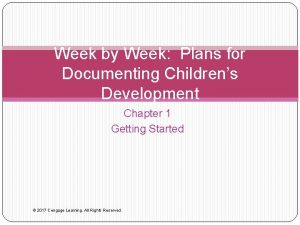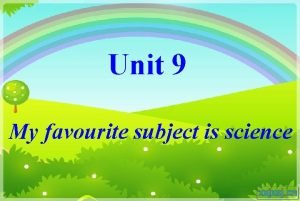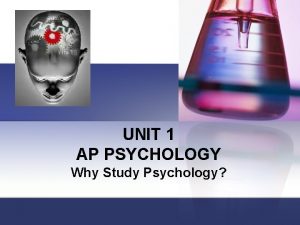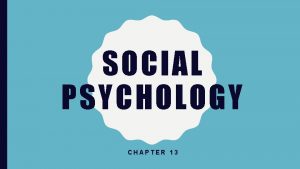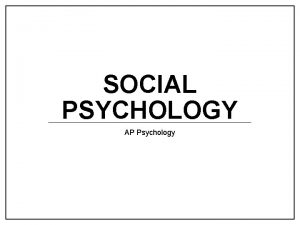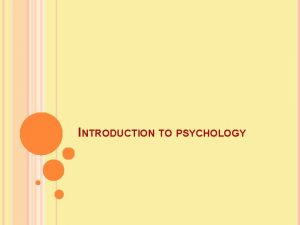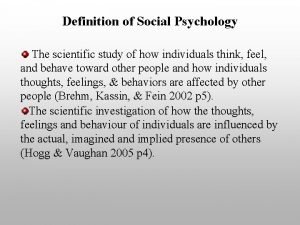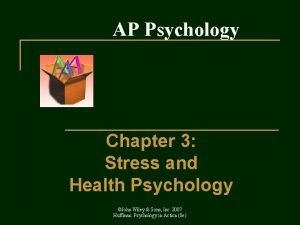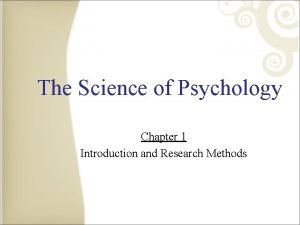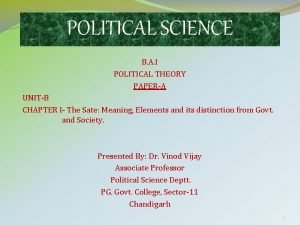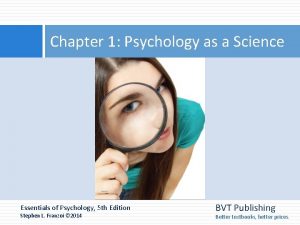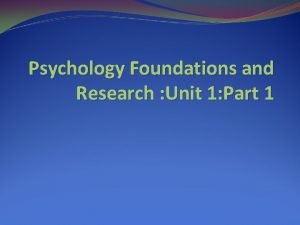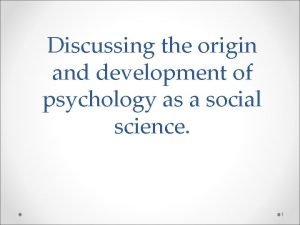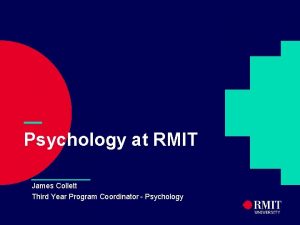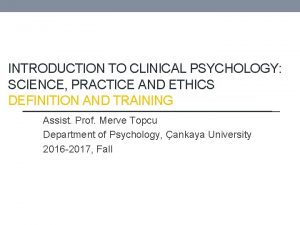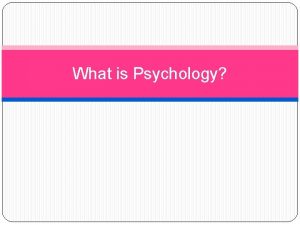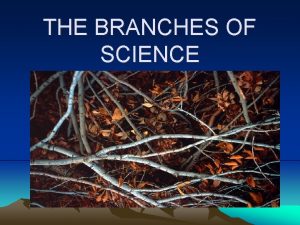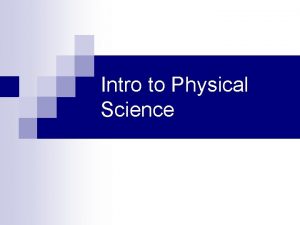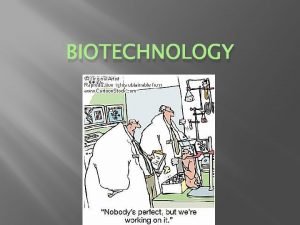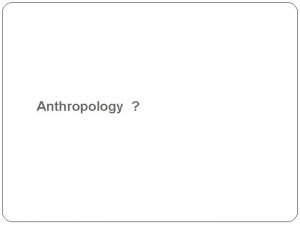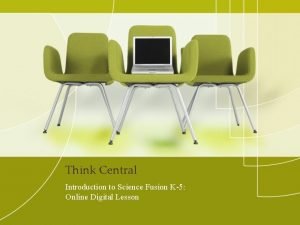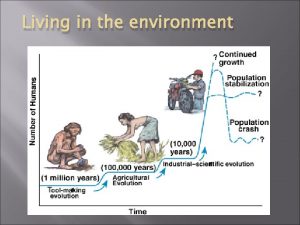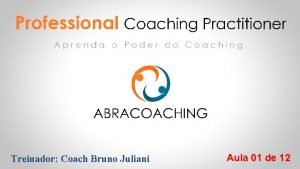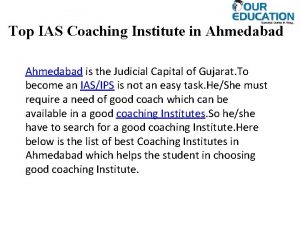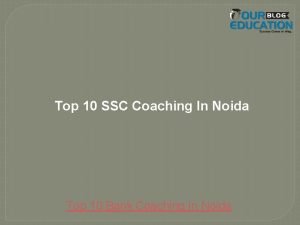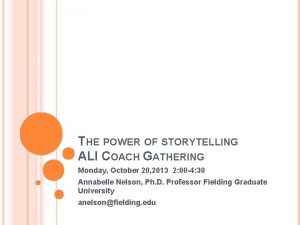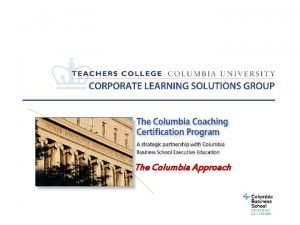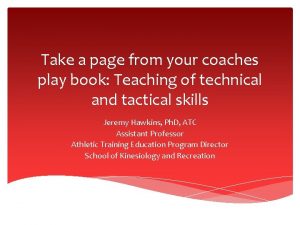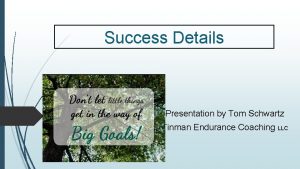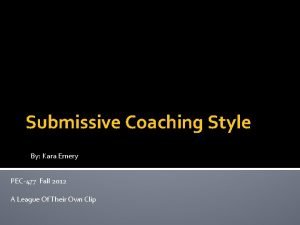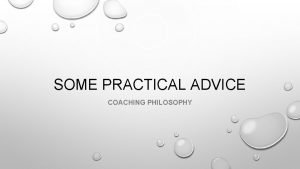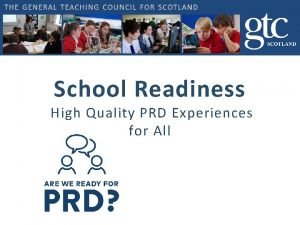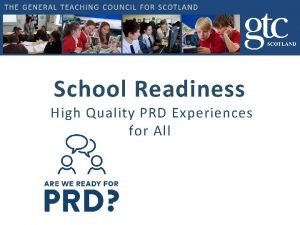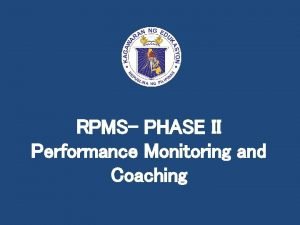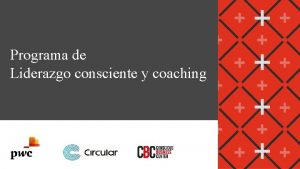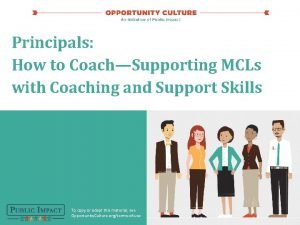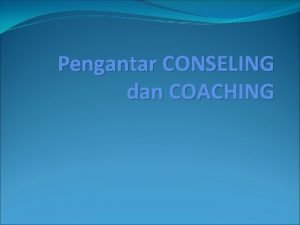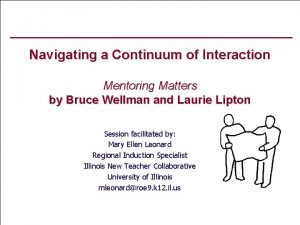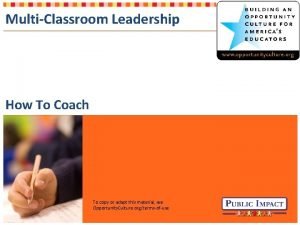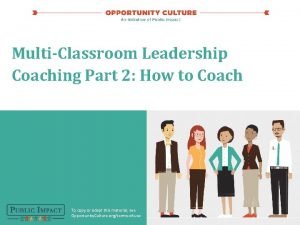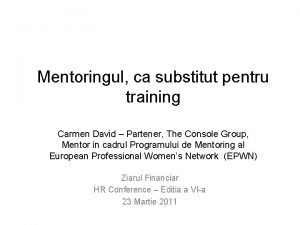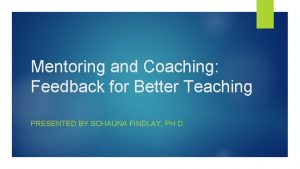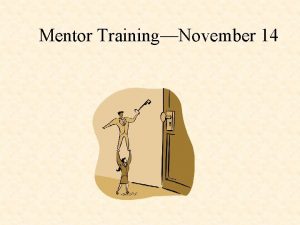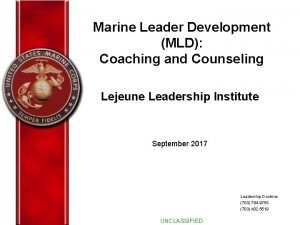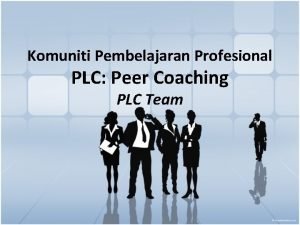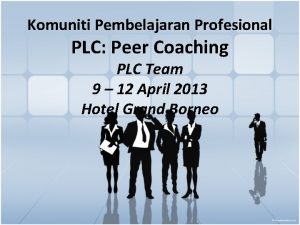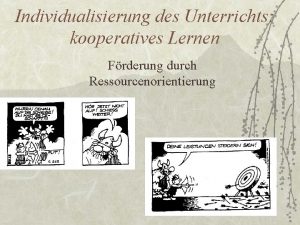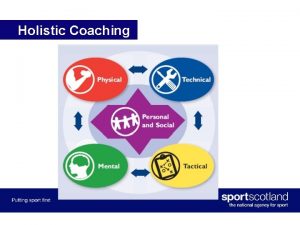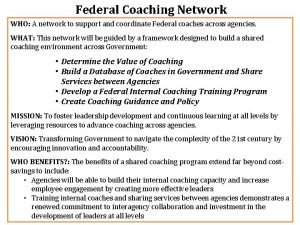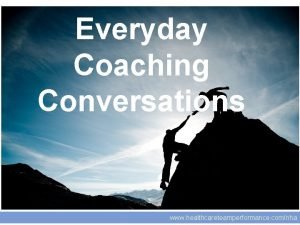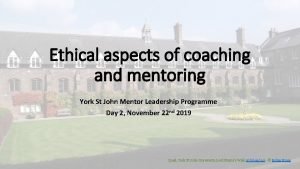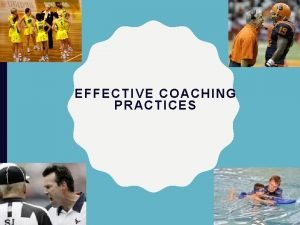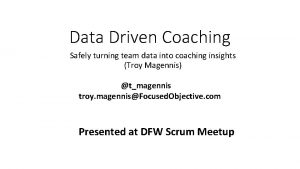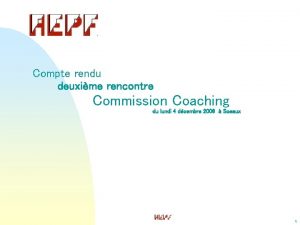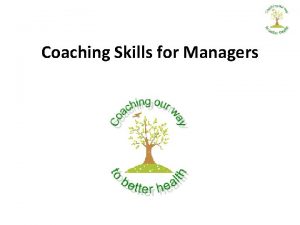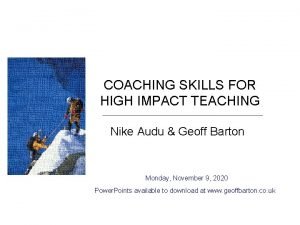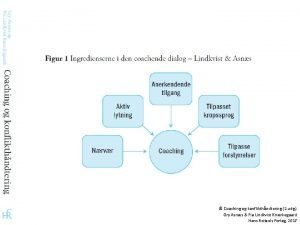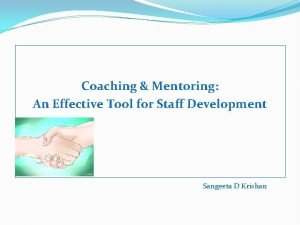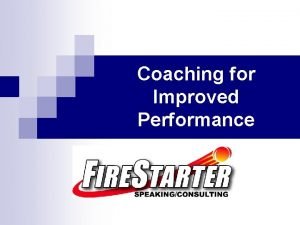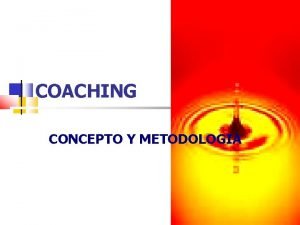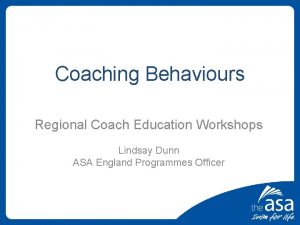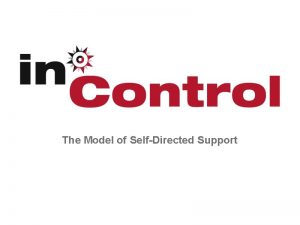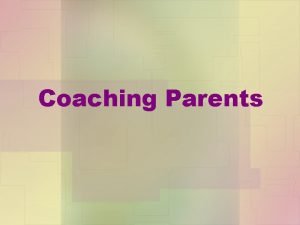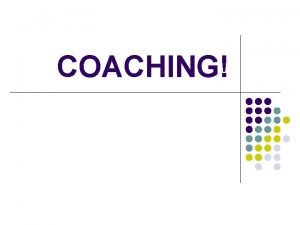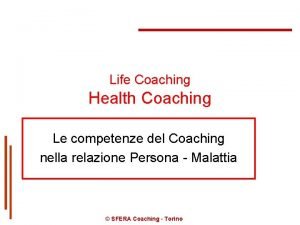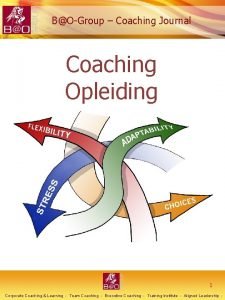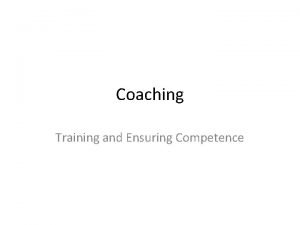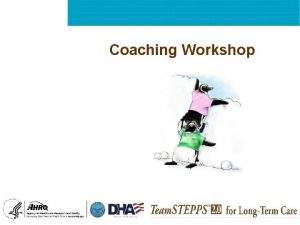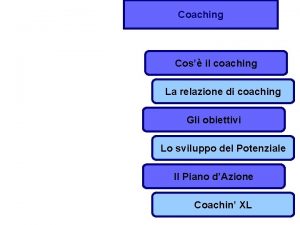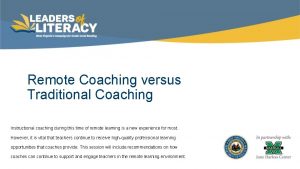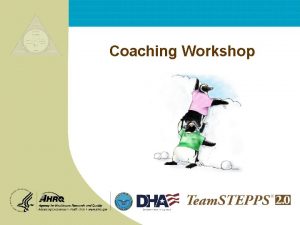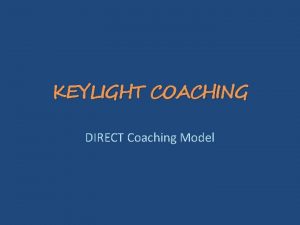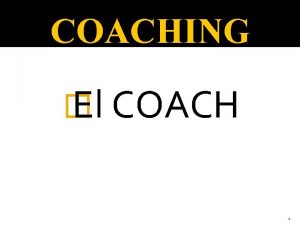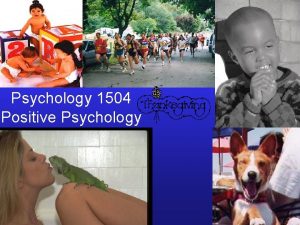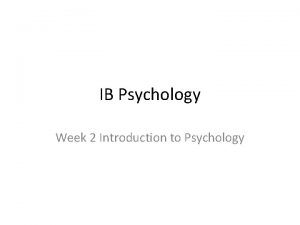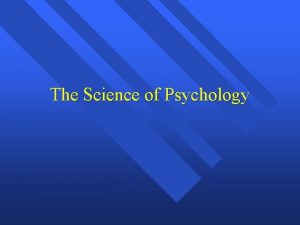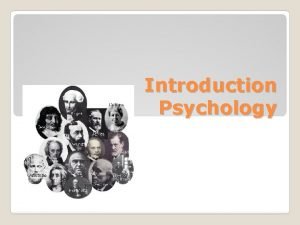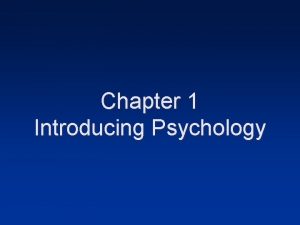Week 3 Science of Coaching Psychology coachfacilitated selfdirected













































































- Slides: 77

Week 3 Science of Coaching Psychology coach-facilitated, self-directed positive neuroplasticity

Week 3 Agenda 1. Coaching Relationship 2. Core Coaching Skills – Mindfulness – Listening – Inquiry – Reflections 3. Skill Demonstrations

Week 3 Coaching Skill: Reflections • Simple • Clarifying • Empathy • Double-sided • Shift focus • Summary

Coaching Skills featured Weekly 1. 2. Listening Open questions 3. Reflections 4. 5. 6. 7. 8. 9. 10. 11. 12. 13. 14. Compassion Fostering positivity Improving readiness to change Mindfulness Generating insight Applying strengths Pathway to hope Formula for thriving Vision to goals Measuring outcomes Harvesting learning

ICF Coaching Competencies A. Setting the Foundation Ethical guidelines, professional standards, agreement B. Co-creating the Relationship Trust, intimacy, presence C. Communicating Effectively Listening, inquiry, direct D. Facilitating Learning and Results Awareness, plans, goals, actions, progress, accountability

Humans need to… – – Belong Be loved Be appreciated Be respected

Attachment theory concludes that humans need relationships to thrive.

Humanism: A growth-fostering domain of psychology Carl Rogers (1902 -1987) was a humanistic psychologist. He defined unconditional positive regard as being completely accepting toward another person without reservation, no matter what the person says or does.

To grow, a person needs… Acceptance being seen with unconditional positive regard Genuineness openness and self-disclosure Empathy being listened to and understood

Genuineness & Authenticity bring insights Build a safe and courageous space, a place where the truth can be told without judgment. Truth carries no consequence other than discovery, insight, and learning.

Empathy is a respectful understanding of another person’s experience …Including his/her feelings, needs and desires

The most important factor determining a positive outcome in therapy is a positive relationship with therapist.

Coaching Relationships Coaching is a Growth Fostering relationship that enables clients to reach their goals and visions.

The Coaching Relationship is a greenhouse where ideas are safe to explore, where ideas are fomented, encouraged, seeded, and expanded

Coaching: Unique and Powerful Relationship Coach – Me Relationship - Us Client – You

Coach Attends To All Three Entities · What is happening in Me right NOW · What is happening in My Client right NOW? · How can I verify my hunch? · What is happening between Us, in the relationship, right NOW?

ICF Competency: Establishing Trust and Intimacy Ability to create a safe, supportive environment that produces ongoing mutual respect and trust. • • • Sets expectations for an open and honest relationship Demonstrates integrity, confidentiality, respect & support. Provides "unconditional positive regard"

Confidentiality The ethical principle or legal obligation that you hold secret all information relating to a client, including his/her name, unless the client gives consent permitting disclosure.

Trust & Rapport Willingness to be vulnerable to another based on the confidence that the other is benevolent, honest, open, reliable and competent Bob and Megan Tschannen-Moran, 2004

Building Trust Confidentiality Relationship delivers results Unconditional positive regard. Small things like being punctual for sessions Respecting their vision and action plans “On their side” Works both ways Built over time Honest and direct for their sake. Reliability

Connect Fredrickson, B. Love 2. 0, 2013

Rapport Executive Center Judgment Center You Center Reward Center Association Vision Default Network

OTHER RELATIONSHIP TOOLS

Walk the Talk Actions speak louder than words

Positive Reframing

Humor & Playfulness Humor & understanding are best friends · Shift perspective · Humanizing element · Detach from seriousness

Championing Standing up for clients when they question their abilities

Relationship Eroding Behaviors 1. The desire to be expert (The Fixer) 2. Need to be needed (Rescuer) 3. Taking on client’s responsibility for outcomes 4. Biases, blurred boundaries, judgments 5. Coach motives mistaken for clients’

Expert Approach Coach Approach • • • Authority Educator Defines agenda Feels responsible for client Solves problems Focus on what’s wrong Has the answers Interrupts if off topic Works harder than client Wrestles with client • • • Moore, Tschannen-Moran: Coaching Psychology Manual. LWW. 2009 Partner Facilitator of change Elicits client’s agenda Client is responsible Fosters possibilities Focus on what’s right Co-discovers the answers Learns from client’s story Client works as hard as coach Dances with client

1. Which of the Coach Approach behaviors/beliefs do you currently use/apply? 2. Which of the Expert Approach do your recognize you overuse or feel most comfortable with? 3. How might being aware of this non-coachlike tendency get in your way as a coach? 4. Which 3 of the Coach Approach bullets will you focus on first?

CORE COACHING SKILLS • • Mindfulness Listening Open-ended questions Reflections

Mindfulness

People walk around on automatic pilot, seldom aware of the present moment Mindfulness is the opposite of automatic pilot

Mindful Openness & Presence 34

Mindfulness is the non-judgmental awareness of what is happening in the present moment. https: //www. youtube. com/watch? v=i. Qn 8 Vuz w. CQ

• My present moment Self – emotions, feelings, needs, judgments, body, intuition, etc. · Client’s present moment experience · What’s happening in our present moment relationship

Create a Calm Environment • • • Slow down Relax Breathe Minimize distractions Get present

Tune into Awareness Present moment awareness of inner and outer environment: • Mind • Body • Physical space

Being Present helps Coaches… • • • Listen and focus deeply Access insights and intuition Elicit provocative questions Enable creative reflections Support boundary setting

The Ah-Hah! Moment Mindful presence and reflection helps a client’s brain have insights.

Week 1 Coaching Skill: Mindful Listening • Non-judgmental awareness of what someone is saying • Not thinking about what I will say next • Weaving the last words into the next step • Weaving the client’s story into later steps • Pausing before responding • Listen for emotions as well as facts • Not interrupting Moore, Tschannen-Moran: Coaching Psychology Manual. LWW. 2009

Good Conversation Begins With Good Listening Skills https: //www. youtube. com/watch? v=G-KLbry. FQDY

Active Listening: What it’s not https: //www. youtube. com/watch v=DK 4 i. UCrw. PM

Active Listening: What it is https: //www. youtube. com/watch ? v=ESuj. TCel 6 l. M

Road Blocks to Listening • Ordering, directing or commanding · Warning or threatening · Giving advice, making suggestions, providing solutions · Persuading with logic · Arguing, lecturing · Moralizing, preaching · Telling clients their duty · · · · · Agreeing, approving, praising Shaming, ridiculing, name calling Interpreting, analyzing Reassuring, sympathizing, consoling Probing, questioning Withdrawing, distracting, humoring Changing the subject Judging, criticizing Disagreeing, blaming Thomas Gordon

Demo Road Blocks to Listening

Level 1 of Active Listening I hear the words… but the focus is on: What does this mean to me?

Level 2 of Active Listening • Focus is on the other person without much awareness of the outside world • Listening to client’s words, expressions, emotions -- everything they bring • Empathy, clarification, collaboration

Listen to Client’s Emotions Our hearts often know the truth before our heads

Level 3: Global Listening • Pick up on emotion, body language • Notice environment • Tune into sensory data, mood, pace, energy • Notice what is not said • Access intuition

Active Listening https: //www. youtube. com/watch? v=Nh. JYNU YNH-Y

Mindful Listening Exercise • Pay attention to conversations that take place in your head. • What distracts you from fully paying attention to listening? • Note thoughts that commonly distract you in conversations. • What do you notice? • What learning did you take from this exercise?

Week 2 Coaching Skill: Open Questions • Open, Curious, Beginner’s Mind • What and How questions • Be cautious with Why questions • When to use closed questions

Open-ended Questions Powerful questions emerge from a coach’s curiosity, opening doors and windows for clients. • Inviting • Spacious • Brings on a hush

Is this an effective strategy for you? What would make this an effective strategy for you? Is there more to be learned here? How could you amplify the learning in this experience? It sounds like you're stuck between those two choices - is that true? What's another choice you could make besides the two in front of you?

Open and Closed Questions https: //www. youtube. com/watch? v=Ro. B-- jh. PIus

Simple, profound questions get to the core • What's next? • What about that is important to you? • What did you learn? • What are you willing to change? • What is the opportunity? • What here do you want to explore? • How do you want it to be? • What are the possibilities? • What is your desired outcome? • What kind of plan do you need to create? • Where will this lead? • How is this working?

Audio Demo Open-ended Questions

Reflections • A reflection is a guess to confirm or deny the meaning of what the client said • It seeks to understand the client’s subjective experience • It is said in the form of a statement and is less likely than a question to evoke defensiveness • It requires an answer and is more likely to encourage continued exploration

Active Listening With Reflections https: //www. youtube. com/watch? v=Nk 3 OW 2 6 q. TMY

Types of Reflections Simple Restate what the client said Empathy Reflect the feelings and needs that have been expressed Double-sided Reflect both pros and cons of a change explored by client Shifted Focus Moves the topic to another focus of interest to the client Summary Summarize a group of points made by client

Simple Reflection • A short statement of what you heard your client say. • Use the client’s words/language so s/he can hear him/herself Example You are in your last year of college and you don’t know what you want to major in.

Empathy Reflection • Reflect back from a ‘heart-place’ what you hear the client sharing. • The reflection shows you hear the facts and emotions of the story s/he is sharing. Example You’ve been trying to exercise regularly your entire life. You are feeling frustrated and discouraged.

Empathy Skills https: //www. youtube. com/watch? v=Odkhetd. Bl. Kg

Double-Sided Reflections Reflect ‘both sides’ of the story you hear described. Example You noted several reasons why exercise is so good for you, and at the same time you don’t have time to fit in exercise.

Shift the Focus If a client is stuck, shift attention to another topic of interest. Example Getting more sleep is quite a challenge with two kids in middle school. And, you have also had great success in taking time to walk with your friend on Saturday morning. ”.

Summary Reflection A reflection that collects what a person has been saying and offers it back as in a basket Example: Let me see if I’ve got this right. It’s hard to find reasons to limit sweets in your diet to control your blood sugar, but you want to be around to see your grandchildren. You’d also like to feel better through the day. You have a hard time watching what you eat but you are determined to do a better job at that.

Silence Give time for silence after questions and reflections – to allow clients to widen and deepen awareness and generate insight

Use Reflections to Roll with Resistance • Resistance happens when your client feels judged, not understood, or being told what to do. • A signal to change strategy. • Use a reflection to “roll with resistance” vs pushing against it.

Audio on Reflection

Open-Ended Questions Wide exploration expanding focus and horizon Reflections Narrow focus and deeper dive

Practice 2: 1 • Have a conversation with a family member or friend for 10 minutes • Use at least 2 reflections after asking a question, for a ratio of 2: 1 reflections to questions

Basic Coaching Skills 1. 2. 3. 4. 5. Be mindful and present Have client speak more than you do Practice listening, inquiry, reflections Don’t think about what you are going to say next Listen and reflect emotions 6. Balance open-ended questions with reflections with a two reflections to every question (2: 1)

Ten Commandments from Eric de Haan 1. First, do no harm. 2. Have confidence. 3. Commit yourself heart and soul to your approach. 4. Feed the hope of your client. 5. Consider the coaching situation from your clients’ perspective. 6. Work on the coaching relationship. 7. If you don’t “click” find a replacement coach. 8. Keep yourself as healthy as possible. 9. Try to stay fresh and unbiased. 10. Don’t worry too much about specific things you’re doing.

What insights did you have today?

www. The. Health. Care. Coach. com Darlene@The. Health. Care. Coach. com www. Health. And. Well. Being. Inst. com Darlene@Health. And. Well. Being. Inst. com

Week 3 Science of Coaching Psychology coach-facilitated, self-directed positive neuroplasticity
 Week by week plans for documenting children's development
Week by week plans for documenting children's development Describe your favourite subject
Describe your favourite subject Earth science week
Earth science week Positive psychology ap psychology definition
Positive psychology ap psychology definition Social facilitation example psychology
Social facilitation example psychology Social psychology ap psychology
Social psychology ap psychology Introspection psychology
Introspection psychology Social psychology is the scientific study of:
Social psychology is the scientific study of: Health psychology definition ap psychology
Health psychology definition ap psychology Operational definition examples behavior
Operational definition examples behavior Relation between political science and sociology
Relation between political science and sociology Psychology has its roots in philosophy
Psychology has its roots in philosophy Chapter 1 the science of psychology
Chapter 1 the science of psychology History and origin of science of psychology slideshare
History and origin of science of psychology slideshare History and origin of science of psychology slideshare
History and origin of science of psychology slideshare Rmit criminology and psychology
Rmit criminology and psychology Scope of clinical psychology
Scope of clinical psychology Clinical psychology science practice
Clinical psychology science practice Natural vs social science
Natural vs social science Branches of science diagram
Branches of science diagram Natural and physical science
Natural and physical science Applied science vs pure science
Applied science vs pure science Rapid change
Rapid change Think central science fusion
Think central science fusion Why environmental science is an interdisciplinary science
Why environmental science is an interdisciplinary science Julie lundquist
Julie lundquist Hard and soft science
Hard and soft science Ferramenta de coaching a grande jornada
Ferramenta de coaching a grande jornada Iit coaching in jaipur
Iit coaching in jaipur Ias coaching in ahmedabad
Ias coaching in ahmedabad Ssc coaching in noida sector 62
Ssc coaching in noida sector 62 Top 10 iit coaching in india
Top 10 iit coaching in india Iit coaching in agra
Iit coaching in agra Origence coaching varanasi
Origence coaching varanasi Bank coaching in dehradun
Bank coaching in dehradun Digital storyteller coach coaching
Digital storyteller coach coaching Transformational coaching definition
Transformational coaching definition Columbia coaching certification program
Columbia coaching certification program Coaching juristen
Coaching juristen Five steps in teaching tactical skills
Five steps in teaching tactical skills Tinman endurance coaching
Tinman endurance coaching Command coaching style
Command coaching style Coaching philosophy
Coaching philosophy Gtcs prd wheel
Gtcs prd wheel Coaching wheel gtcs
Coaching wheel gtcs Heart of rpms
Heart of rpms Liderazgo consciente kofman
Liderazgo consciente kofman Difference between feedback and coaching
Difference between feedback and coaching Driver analyzer persuader amiable
Driver analyzer persuader amiable Pengertian coaching
Pengertian coaching Co parent coaching charlotte
Co parent coaching charlotte Coaching mentoring continuum
Coaching mentoring continuum Difference between feedback and coaching
Difference between feedback and coaching Difference between feedback and coaching
Difference between feedback and coaching Partener de training
Partener de training Sample coaching and mentoring program for teachers
Sample coaching and mentoring program for teachers Bmirs
Bmirs Leaders encourage mentoring to assist junior marines with
Leaders encourage mentoring to assist junior marines with Ciri ciri coaching dan mentoring
Ciri ciri coaching dan mentoring Peer coaching plc
Peer coaching plc Konstruktion coaching oberbayern
Konstruktion coaching oberbayern 5 cs of coaching
5 cs of coaching Federal coaches
Federal coaches Grow model template
Grow model template Ethics in coaching and mentoring
Ethics in coaching and mentoring Professional values in teaching scotland
Professional values in teaching scotland Electrical machine design course
Electrical machine design course Casual coaching style
Casual coaching style Data driven coaching
Data driven coaching Compte rendu coaching
Compte rendu coaching Peer coaching examples
Peer coaching examples High impact coaching skills
High impact coaching skills Coaching og konflikthåndtering
Coaching og konflikthåndtering Coaching meaning
Coaching meaning 8 coaching principles
8 coaching principles Coaching for improved performance
Coaching for improved performance Concepto del coaching
Concepto del coaching Coaching philosophy examples
Coaching philosophy examples
